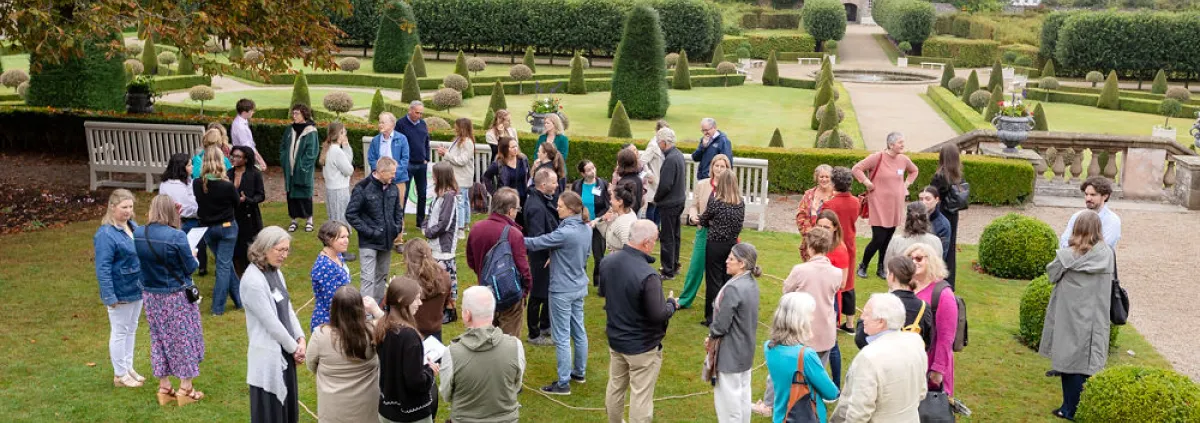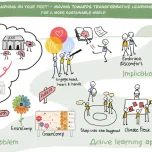Level: Fir Beginner and Intermediate Setting: Formal, Non-formal and Mixed Format: In-person Subject: Inter-Disciplinary |
Authors: Dr. Lucia Walsh, Dr. Olivia Freeman and Dr. Sarah Rawe
Technological University Dublin
Approach
Our approach to ESD & GCE to enhance GreenComp and EntreComp competences is rooted in transformative learning theories and active, experiential pedagogies that focus on nurturing the development of learning mindsets. Our work is also informed by the Head, Heart and Hands approach (Singleton, 2015) that emphasises the importance of learning contexts and Hrach's (2021) approach to the whole bodied approach to active learning that emphasises movement and engagement of senses.
Activities:
1.Escape Room
Two interactive puzzle-based escape rooms, as an innovative and cross-curricular and gamified approach based on (a) the UN SDGs and (b) Climate Change (CC). These educational resources are centred around a narrative, or storyline, designed to immerse learners in the tasks at hand. They aim (a) to introduce participants to sustainability literacy and the UN’s 17 SDGs and (b) to some of the fundamental science and facts related to climate change.
Participants are led through a series of puzzles and are asked to imagine that they have been selected to represent the university at a conference on Climate Change. By progressing through the puzzles and levels, they are asked to plan their trip by informing themselves of some fundamental climate science while selecting the appropriate forms of transport and their conference dinner while minimising carbon emissions.
2. Climate Fresk (https://climatefresk.org/world/)
Climate Fresk concept goes back to 2015 and it was founded as a non-governmental organisation (NGO) six years ago in France. Since then, over 1.5 million people participated in this workshop. Its main aim is to increase climate education levels through engaging, hand-on and collaborative workshops where the participants explore the causes and impacts of climate change and consider actions that can be taken by individuals and organisations to find and implement workable solutions. Climate Fresk content is entirely based on the science facts from the Intergovernmental Panel on Climate Change (IPCC) reports and strives to make climate change more tangible and accessible to people of all ages and backgrounds – it is adaptable for ages 9+.
The participants are given small sets of cards at a time, each containing a photo and description of a science fact related to climate change. Collaboratively, the cards are organised and re-organised, eventually leading to creation of a mural/fresk which is then enhanced by drawing links, illustrations and slogans/name. This follows by expressing emotions and sharing ideas for individual and collaborative actions.
3. 'Step into the Doughnut' and 'The Doughnut Unrolled: Four Lenses' (https://doughnuteconomics.org/tools/step-into-the-doughnut)
‘Step into the Doughnut’ is an open workshop activity designed to introduce participants to the ideas of doughnut economics (Raworth, 2017). The doughnut conceptualisation represents an ecologically safe and socially just space in which humanity can thrive in the 21st century. It consists of two concentric rings: a social foundation to ensure that no one is left falling short on life’s essentials and an ecological ceiling to ensure that humanity does not collectively overshoot the planetary boundaries that protect Earth’s life-supporting systems. The workshop is one of many tools and resources offered by DEAL (Doughnut Economics Action Lab) an emerging global movement aimed at creating 21st century economies that are regenerative and distributive by design.
‘Step into the Doughnut’ involves participants coming together in one group (as small as 10 and as large as 70) in a large outdoor space ideally. Under the gentle direction of facilitators the participants work with two large ropes to form two concentric circles each representing the ecological ceiling and the social foundation of the doughnut model. The workshop takes about one hour and consists of (1) an opening introduction, (2) using the large rope to create the outer boundary, (3) using the smaller rope to create the inner boundary, (4) stepping into the doughnut which involves walking freely around the ropes, (5) paired reflections, (6) group reflection and (7) wrapping up debrief. As a follow up activity, the participants usually engage in emotional debrief and planning of action that is relevant to their practice. 'Doughnut Unrolled: Four Lenses' is especially valuable as a follow up where the participants contemplate, discuss and plan actions in relation to prompts that connect the local and global with ecological and social lens of the doughnut economics.
Developing of GreenComp competences through active-based learning approaches
We have mapped out the activities against both GreenComp and EntreComp frameworks.
For example, 'Step into the Doughnut' nurtures embodying sustainability competences almost as if by design. The script and reflective prompts provided call for deep reflection on promoting nature and supporting fairness, an opportunity to learn some facts around planetary risks and societal shortfall and encouragement to think about existing economic and value systems in the context of this newly presented knowledge while walking in silence around the planetary boundary and social foundation representations created through the rope activity. Systems thinking is also supported in an embodied way as participants exert tension on the rope circles they have formed before placing them on the ground and have a moment to contemplate the interconnectedness of the boundaries being considered. The prompts also support critical thinking and problem framing around dominant frames of economic thinking and re-imagining of current business models. The Doughnut Unrolled ‘four lenses’ activity supports futures literacy as participants imagine and plan for alternative and preferred sustainable futures. A big emphasis is also placed on collective action and individual initiative as participants are strongly encouraged to identify and commit to paper goals to be actioned within their personal and professional sphere of influence for positive change.
Pedagogical approach
In all of these activities, the participants work collaboratively using movement, discussion and trial and error approach. In Climate Fresk and Escape Room activities, no explicit instructions are provided from the start to the end of the activity, so tasks can initially appear ambiguous requiring learners to think on their feet and rely on their own critical thinking skills.
The role of the facilitator is to provide guidance but not too much information as this hands off approach leads to a better learning outcome and lasting impact.
Future plans
We are planning to scale up the use of these activities in our university and beyond. For example, we now have 18 Climate Fresk facilitators who have plans to use the activity with their own students in 2024-25 academic year.
Since being introduced to the 'Step into the Doughnut' activity by the Irish Dougnut Economics Network (IDEN) a year ago, we have embraced it and delivered it to over 100 participants connected with our university. After delivering the 'Step into the Dougnut' activity at a recent IDEN event with the author of doughnut economics Kate Raworth present, we feel really encouraged to continue with introducing others to the DE concepts and establishing other collaborations & actions.
The escape rooms have been written by one of the co-authors Dr. Sara Rawe and can be adjusted to particular disciplines or other topics. With a guide and support, other colleagues will be trained so they can deliver it to their own student and other groups.
We are also exploring other play based active learning approaches that we can introduce to learners so they can enhance their knowledge, skills and attributes leading to developing GreenComp and EntreComp competences which then will lead to paradigm and system shifts, collaborations and action.
Acknowledgements and resources:
Storyboard image created by Harriet Robjin as a gift from 3e conference organisers where the paper based on these activities won the best paper award
IDEN - thank you to introducing us to the 'Step into the Doughnut' and 'Unrolling the Doughnut' activities Roisin Markham, Dee Murphy, Lara Kelly and the Dominican sisters. See Doughnut Economic Action Lab for great resources.
Climate Fresk - invaluable support from Leslie Marce, Ireland national coordinator



Excellent learning SDGs ODS
Please log in or sign up to comment.